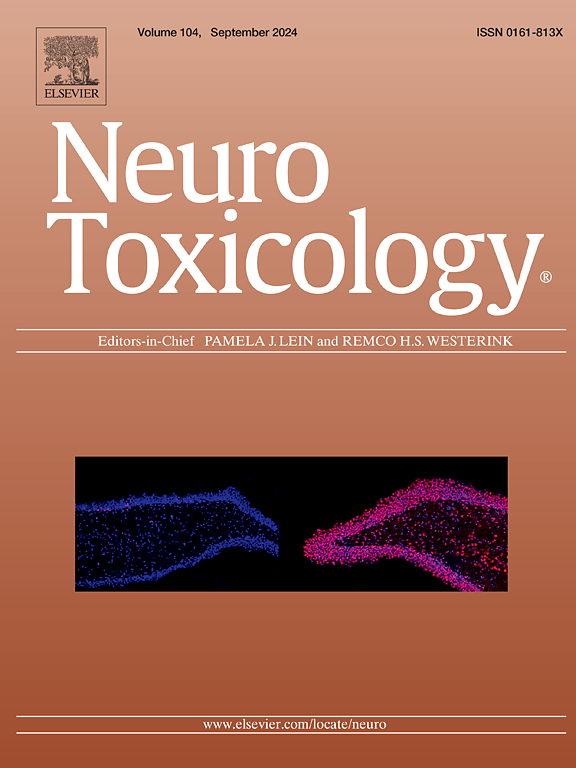Protective role of root-derived betulinic acid from Artocarpus heterophyllus against arsenic-induced neurotoxicity in Drosophila melanogaster
IF 3.9
3区 医学
Q2 NEUROSCIENCES
引用次数: 0
Abstract
Exposure to arsenic (As) has several adverse health effects, including cognitive deficits in humans and animals. In the present study, neuroprotective effect of Artocarpus heterophyllus root derived purified (98 %) betulinic acid powder (BAP) was examined against As induced neurotoxicity in Drosophila melanogaster (Oregon K, wild type). BAP was well characterized using HPTLC and LC-MS. Adult flies treated with As alone showed significant behaviour deficits, enhanced oxidative stress, neurotoxicity, and mortality. Further, flies were co-fed with BAP along with As (0.5 mM) for 7 days. As a result, BAP decreased the mortality rate in a concentration dependent manner against As toxicity (36–77 %). Behavioural studies indicated that flies treated with BAP had an improved locomotor phenotype and increased survival potential (18 days) for As induced flies. The biochemical analysis revealed that BAP restored As induced elevation of oxidative markers in both head and body regions of flies. BAP enhanced the activity of membrane-bound enzymes such as succinate dehydrogenase and NADH-cytochrome c reductase. Additionally, it was found that BAP alleviated cholinergic disturbances and dopamine depletion, which are associated with As and bring down abnormal brain architecture to normal. Overall, data suggests that BAP may provide neuromodulatory effects against As-induced neurotoxicity by suppressing oxidative stress and attenuating mitochondrial dysfunction.
杂叶树根源白桦酸对黑腹果蝇砷中毒的保护作用
接触砷对健康有若干不利影响,包括人类和动物的认知缺陷。本研究以野生型黑腹果蝇(Drosophila melanogaster, Oregon K,野生型)为研究对象,研究了纯化(98. %)白桦酸粉(BAP)对砷诱导的神经毒性的保护作用。采用HPTLC和LC-MS对BAP进行了表征。单独用As处理的成年果蝇表现出明显的行为缺陷、氧化应激增强、神经毒性和死亡率。将BAP与As(0.5 mM)共喂7 d。结果表明,BAP对砷中毒的死亡率呈浓度依赖性降低(36-77 %)。行为学研究表明,经BAP处理的果蝇运动表型得到改善,As诱导的果蝇存活潜力(18天)增加。生化分析显示,BAP恢复了As诱导的果蝇头部和身体氧化标记物的升高。BAP增强了琥珀酸脱氢酶和nadh -细胞色素c还原酶等膜结合酶的活性。此外,BAP还能减轻与As相关的胆碱能紊乱和多巴胺耗竭,使异常的脑结构降至正常。总的来说,数据表明BAP可能通过抑制氧化应激和减轻线粒体功能障碍,对砷诱导的神经毒性提供神经调节作用。
本文章由计算机程序翻译,如有差异,请以英文原文为准。
求助全文
约1分钟内获得全文
求助全文
来源期刊

Neurotoxicology
医学-毒理学
CiteScore
6.80
自引率
5.90%
发文量
161
审稿时长
70 days
期刊介绍:
NeuroToxicology specializes in publishing the best peer-reviewed original research papers dealing with the effects of toxic substances on the nervous system of humans and experimental animals of all ages. The Journal emphasizes papers dealing with the neurotoxic effects of environmentally significant chemical hazards, manufactured drugs and naturally occurring compounds.
 求助内容:
求助内容: 应助结果提醒方式:
应助结果提醒方式:


